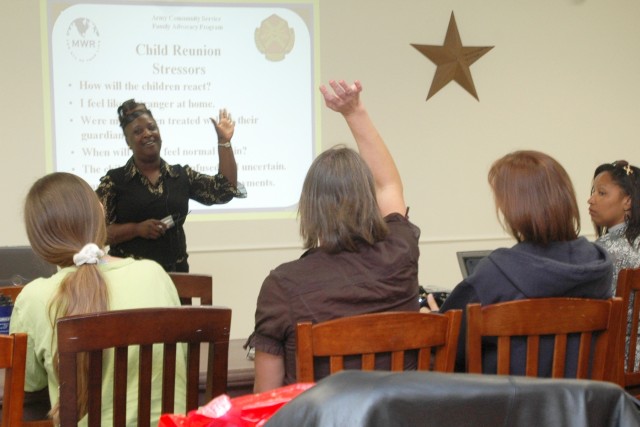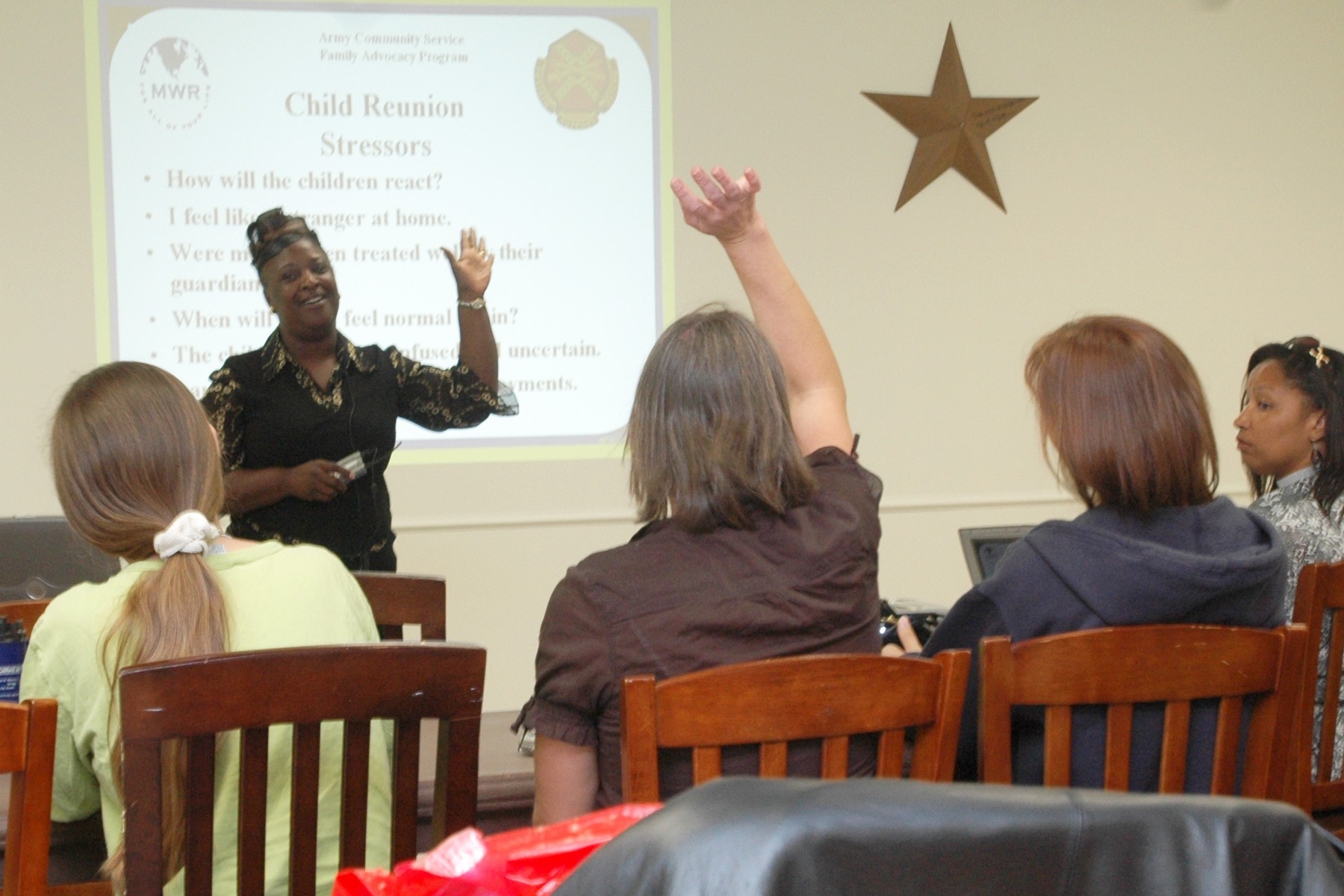
FORT HOOD, Texas - As the families of the 1st Cavalry Division's 15th Sustainment Brigade welcome their Soldiers home, the rest of the First Team spouses are spending time learning what to expect and how to prepare for the reunion with their loved ones.
Spouses, from the 1st Air Cavalry Brigade, came together to learn what to expect from their returning troop during Reunion and Reintegration Training Oct. 25 at the Oveta Culp Hobby Soldier and Family Readiness Center here.
Mary Prater, a representative for the Family Advocacy Program, spoke to spouses about how to slowly reintegrate their Soldier back into family life.
"This is a stressful time for not only the families here, but for the Soldiers as well," said Prater. "There have been many changes for both the Soldiers and the families in the last year. You must work together top adjust to these changes."
It can also be difficult for the children to adjust.
"Many children may have a lot of questions. They may act out for attention, or be resentful to the parent for leaving," Prater said. "Continue with the current routines, discipline and activities, and slowly integrate your spouse back into these areas of life."
Following family advocacy, a representative from Army Community Service discussed how to correctly plan for reintegrating the deploying parent back into the family.
"It's important to communicate with Soldier - both now and when they get home," said Dave Gretsch, the ACS representative. "There will be obvious changes. Time changes everything - take the time to take in these changes before reacting to them."
During the open discussion with the spouses, Bridgit Lawson, wife of Staff Sgt. Darren Lawson, 4th Battalion, 227th Aviation Regiment, explained what she has learned about the "C2" of reunion.
"We can't come together and have a successful reunion if we don't communicate and compromise," she said. "The Army has a version of C2 - command and control. But in reunion you can't have command and control if you want it to work. You have to communicate and compromise through the hard times and changes that have happen while you have been apart."
Also, Stacy Nelson, a social work case manager originally from Holland, Mich., took time to discuss how the stresses of the deployment may affect the Soldiers and how to tell the difference between Post-Traumatic Stress Disorder and post-deployment (combat) stress.
"One-hundred percent of Soldiers returning from Iraq will have some form of PTSD and combat stress. Everyone in this room will have combat stress," she said. "However, only five to ten percent of the returning Soldiers will develop full PTSD."
Nelson gave them an idea of what to expect.
"Many of your husbands will not want to talk about what they have experienced, others will have family or friends tell them to not think about it," she continued. "But not talking about it and holding everything in can be harmful."
Nelson explained that the mind is like a filing cabinet and sometimes it takes a while for it to figure out where everything goes.
"When people hold in bad experiences and don't talk about what they have seen, done or been through, the mind doesn't have a chance to process the information and put it away so that it no longer affects day-to-day activities," she said. "Talk to your spouse, and remember that you don't need full details to communicate and help them through this process."
As the briefing came to a close, Maj. Shane Curtis, the 1st Air Cav. Bde. rear detachment commander from McMinnville, Tenn., spoke about how they will find out their Soldier is on the way home.
"A 'green suiter' will call each Family letting them know the date and codename for the flight that their Soldier is on," he explained. "For security reasons, we will not give the families the time for the flight or the flight number. However, they will be given the time for the reunion ceremony, which will be held once the Soldiers have completed the first portion of the reintegration process and signed out for a three-day pass."
Once the Families have been contacted letting them their Soldier is on their way home from Kuwait, the family will receive up to three more phone calls updating them with the progress of their Soldiers flight.
"The only call that a family may not receive before their Soldier lands is a call stating that the flight has left its final stop before arriving here at Ft. Hood depending on the location of the final stop, and how close they are to Ft. Hood," Curtis explained. "To ensure we are able to contact all families, please make sure your Soldier and the rear-detachment has updated phone numbers for where you will be."
Curtis went on to explain the process that the Soldiers and families will go through once the Soldiers have completed their three-day pass.
"Reintegration is not only for the Soldiers," he said. "There is also a portion of the training that is for the Spouses and both the Soldiers and spouses are encouraged to attend."
When the Reunion Training and Reception Brief were completed each spouse walked away with a few key comments at the forefront of their minds.
The first of these comments was made by Prater, who said "The key to the reunion and reintegration process is communication and using your resources."
Another important fact to remember was made by Gretsch, "Readjustment takes time. Things will start to feel normal in 30-90 days."
But all spouses and families need to remember that there have been major changes made at home and abroad during the past year. Things will never be as they were before the deployment.
Nelson made the final key comment. "There will be a new normal. Give yourself and your spouse time to adjust, reunite and reintegrate."

Social Sharing